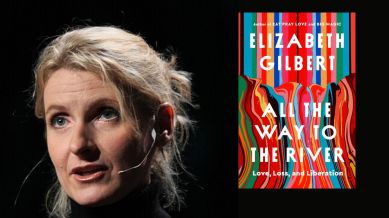Aishwarya Khosla is a journalist, currently serving as Deputy Copy Editor at The Indian Express. Her writings examine the interplay of culture, identity, and politics. She began her career at the Hindustan Times, where she covered books, theatre, culture, and the Punjabi diaspora. Her editorial expertise spans the Jammu and Kashmir, Himachal Pradesh, Chandigarh, Punjab and Online desks. She was the recipient of the The Nehru Fellowship in Politics and Elections, where she studied political campaigns, policy research, political strategy and communications for a year. She pens The Indian Express newsletter, Meanwhile, Back Home. Write to her at aishwaryakhosla.ak@gmail.com or aishwarya.khosla@indianexpress.com. You can follow her on Instagram: @ink_and_ideology, and X: @KhoslaAishwarya. ... Read More
Elizabeth Gilbert’s new memoir sparks debate — is ‘All the Way to the River’ healing or harmful?
At the heart of the controversy is Elizabeth Gilbert's alleged claim that “romantic breakups and divorces are among the primary causes of suicide, homicide, and addiction relapse.”

Elizabeth Gilbert’s new memoir, All the Way to the River, released on September 9, 2025, has set off a passionate debate across the literary world. The book, which explores her relationship with the late musician Rayya Elias alongside Gilbert’s own struggles with addiction and recovery, has been praised for its raw candor but also criticised for sweeping generalisations that some argue risk oversimplifying, even sensationalising, the realities of mental health and grief.
At the heart of the controversy is Gilbert’s alleged claim that “romantic breakups and divorces are among the primary causes of suicide, homicide, and addiction relapse.” Purportedly, presented without citation, the line has become a lightning rod.
monthly limit of free stories.
with an Express account.
Kathleen Schmidt, who has spent more than 25 years in publishing and is president of KMSPR, a strategy and branding firm for authors and publishers, called the claim “very dangerous.” “In her memoir, Elizabeth Gilbert makes a claim (WITHOUT CITATIONS) that ‘Romantic breakups and divorces are among the primary causes of suicide, homicide, and addiction relapse…’ Really? Where is the evidence on this? I promise you that any time I was suicidal, it was not about those things. It was because I had no control over the depression and felt worthless.”
For Schmidt, the issue is not abstract. She has spoken publicly about losing her brother to an overdose and bristled at Gilbert’s early assertion that “all of us” are addicts. “All of us are not addicts. Hard stop,” she wrote. “You can’t apply a term to everyone to make yourself feel better.”
That frustration is shared by others in recovery communities. “As a recovering alcoholic, with 16 years sobriety, this really is appalling,” wrote Kay Stratton, a Substack user. “This pathologising of everything is an erosion of the language we use to start to understand the seriousness of addiction. I’m angry too. Gilbert is wrong here and basing her whole schtick on this is unconscionable.”
Is publishing industry to blame
Some critics have widened the lens, pointing to the publishing industry itself. River Selby, a nonfiction writer, argued that Gilbert’s book reflects a systemic failure: “Books aren’t fact-checked. I had to fact-check my own book, which was absolutely tedious and time consuming but totally worth it — but many writers won’t do this… This is, in my opinion, egregious on many levels. But someone like Gilbert has the money for a fact checker.”
Even Gilbert’s promotional rollout has invited pushback. In one video, she remarked, “I hardly know anybody who doesn’t use someone or something to check out or distance themselves from the difficulties of life.” To some, this felt less like vulnerability than a sweeping diagnosis. Writer Sema Karaman called it troubling: “The pitch is simple enough: Elizabeth Gilbert is now an addict, so we should all become one… This type of marketing that brands Gilbert as a messiah who finally understood that everyone is an addict, and whose one book will save all of us, raises serious ethical questions.”
Bouquets and brickbats
Yet for all the criticism, the book is far from universally condemned. Some readers insist its unfiltered approach is what makes Gilbert resonate. “You can say whatever you want about her, but she’s a courageous writer and a ….storyteller,” wrote Marina Brox, who said she was “lapping it up and enjoying it way more than Eat Pray Love.”
Jerry Portwood, former editor and the founder of The Queer Love Project that explores LGBTQ+ stories, listened to the audiobook, and said: “Yes, it’s disturbing and messy (and perhaps even corny), but the level of self-investigation is staggering. And I plan to listen to parts of it again since it’s made me rethink some of my own motivations with love, sex, romance, friendships and being a ‘good person’.”
The divide reflects a larger question facing memoir in the age of social media and self-help: how should writers balance personal truth with broader responsibility? Can a memoirist claim universality without undermining the specificity of lived experience?
For now, All the Way to the River has ensured one thing: Elizabeth Gilbert remains a writer who commands attention — not only for her storytelling but for the debates her work ignites. Meanwhile, All the Way to the River,is Oprah Winfrey’s new book club pick.